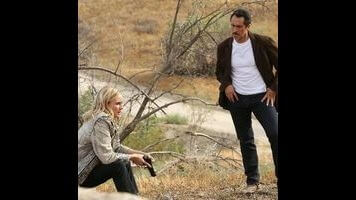“Jubilex” didn’t feel like a finale to me. Sure, storylines were wrapped up with just enough to get the second season started, but it was the first time throughout the second season where I really wanted to know what comes next. But we’re at the conclusion of the season and we’re going to have to live it. Taking the long-range view, this season of The Bridge was hampered throughout by the first, an albatross its neck that it could only really shake free after the showdown at Red Ridge. There were expectations and storylines that needed to be closed from the show’s first offering, and those didn’t mesh well with the darker character study the show had become. It was a darker offering than the first season, with more complicated twists and turns. But it also felt more grounded in the reality of the world that it exists in. A mastermind serial killer who succeeded based on incredible circumstances didn’t have the same real-world feel that a deep investigation into how deep the roots of corruption go in both the United States and Mexico. Both season one and season two may have had the same characters, but they were very much different shows, with their own drawbacks and positive notes.
Director John Dahl, the Rounders filmmaker who also took the helm of last season’s literal-bridge showdown “Take the Ride, Pay the Toll,” did a masterful job with “Jubilex,” from the pacing to the particularly spectacular shot of Hank dropping to the ground to see if his attacker is dead, only to see blood dripping before the body eventually drops. I wasn’t surprised to see that Dahl had also worked on Hannibal and Justified, bringing aspects of both into this episode. Dahl’s direction certainly announced the theme of the episode, and the season as a whole: Choice, not circumstance, makes the person. The past certainly informs the future, but it does not define it. It’s best demonstrated through my favorite scene of the episode: As Fausto sat in the jail cell alongside Marco, the frame separates the two by bars. These boys grew up together to become very different men. Fausto viewed Marco’s father as a giant, a hero, the type of man who has five assassins after him and manages to kill four. But Marco only sees his father as the dope grower who left his mother with nothing. One of Marco’s scenes with Romina said it all: She doesn’t have to be like her father, just as he did not need to be like his.
Similarly, Sonya and Eleanor are both products of terrible home environments, taken in by surrogate fathers, but it’s Sonya who gets to save her counterpart. Sonya could be the end of Eleanor. But the moral code she has chosen for herself, informed, but not defined by her life with Hank, prevents that. The same could be seen in her relationship with Jack Dobbs. She is not her sister, and that is her current choice to make. I understand the role that Eleanor played throughout the season, as a counterpoint to Sonya, but she was oddly downplayed in the latter episodes, especially because she was such a focus to begin with. While her backstory was inherent to her character, it was also off-putting and other-worldly at times. Last season, the weird-for-weird’s-sake characters added humor and color, like Buckley did this season, although I wished we could have spent some more time with him (R.I.P. Buckley). Eleanor added another thread to be untangled. She was the catalyst for bringing Sonya and Marco back together, but her murder of an innocent child became an afterthought as bigger events started to take shape. As her crimes were forgotten, she became less important.
Similarly muddled by the end were Daniel and Adriana, who I at one pointed called the linchpins of the show, although not to the degree that I felt Eleanor was. Their investigation eclipsed their personal storylines, which culminated in Adam Arkin’s Federal Investigator explanation: The CIA tried to take advantage of the banks crashing in order to flush out cartel money, but the operation got out of control. Yet, Daniel and Adriana are such strong characters that they still resonated with comparatively less screen time. Their storyline, which encapsulated the theme that the U.S. has its own issues of corruption and bureaucracy, looks like it will be one of the driving factors of a potential next season. And, I must admit, I got the warm and fuzzies when Daniel grows concerned over Adriana’s well-being after he learns that she had harmed herself in the past.
So that leaves us with Linder, who made it out of the gunshot wound to the stomach in order to reunite with his lady, Eva. While last week I was premature in writing his obit, Linder remains an empty character for me. Like Eleanor, he is one of those weirdos that seek to make the world of The Bridge a more interesting place, but he amounted to nothing other than a distraction.
As I’ve said before, there was a great show hiding inside The Bridge, and I’m glad the finale let that shine through. I wasn’t the hugest fan of this season of The Bridge, but I certainly didn’t hate it either. It’s those glimmers of the potential show that keep me invested, and I would love a third season if only because I’d love to see what the writers’ room can do without having to clean up after the first season.

 Keep scrolling for more great stories.
Keep scrolling for more great stories.
